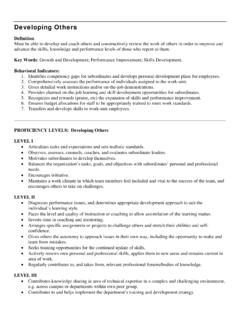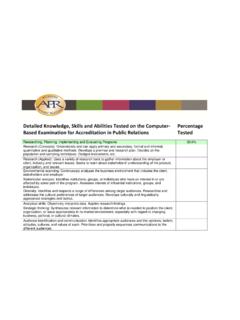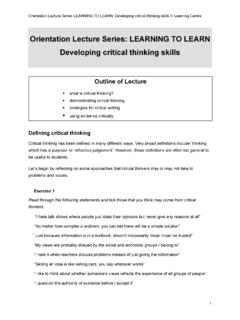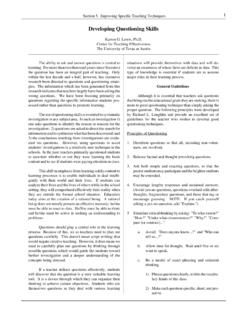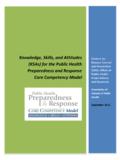Transcription of Developing Facilitation Skills - Combat Poverty
1 Combat Poverty AgencyBridgewater CentreConyngham RoadIslandbridgeDublin 8 Tel: +353 (0) 1 670 6746 Fax: +353 (0) 1 670 : 10 Developing Facilitation Skills A Handbook for Group FacilitatorsresourcesDeveloping Facilitation SkillsA Handbook for Group FacilitatorsPatricia PrendivilleDeveloping Facilitation Skills - A Handbook for Group Facilitators is aimed at people who are already working with groups, who have some experience of facilitating and who wish to develop their Skills in this area of work. The handbook outlines the theory of Facilitation and its links with group development. It provides the reader with a practical programme of Skills development and advises on creating realistic goals in relation to particular areas of group development, outlining throughout how self-reflection and self-analysis are key to this book is designed to be used over a period of time by the reader who is a trainee facilitator and keen to learn more.
2 Developing Facilitation Skills comes with practice, self-awareness and an openness to challenging ways of operating. The questions and exercises in this publication will act as a guide on this Facilitation SkillsA Handbook for Group FacilitatorsBy Patricia PrendivilleSince Developing Facilitation Skills was first printed in 1995, it has been used extensively by a very wide range of people who wanted to develop, enhance and expand their Facilitation Skills . It is a great delight to know that the book is still relevant, useful and meeting the need for which it was thanks to all the users and readers of the book for their feedback and special word of thanks and appreciation to the trainers in Meitheal who have worked with the material and made it a live tool of learning and development. They are: Catherine Dowling; Marie Harding; Annette Halpin; Mick Scully; Conor Rowley, and Anne Troy. Fran Keyes and Joan Mooney, both former trainers with Meitheal, also contributed to the book s use and application by many people Developing their Facilitation revised text has been informed by feedback from the current panel of trainers in Meitheal and staff with Meitheal who have wide-ranging experience of providing training in the use of these Skills and in Facilitation themselves: Helen White; Maeve Healy; Ann Hegarty; Julie U Chr in n, and Annette own group work and Facilitation Skills have continued to develop in the intervening years and are always enhanced by each and every group I work with.
3 I hope this book contributes to the ongoing development of Facilitation as a tool for participation, inclusion and positive social change to support the development of a more equal and just , my thanks to all in Meitheal who, during the past ten years, have made the contents of the book a reality in community development and social change PrendivilleMeithealMay, 2004 Developing Facilitation Skills A Handbook for Group Facilitators | Acknowledgements Combat Poverty Agency 1995 Updated December 2002 New Edition 2008 ISBN 978-1-905485-67-3 While every effort has been made to ensure that the information contained in this handbook is accurate, no legal responsibility is accepted by the author or the Combat Poverty Agency for any errors or 7 Chapter One 9 Using this Book Chapter Two 13 Working with Groups What is Facilitation ? Styles of Facilitation Principles and values limitations The individual The group Spotlight on the facilitator Understanding the group Spotlight on the facilitator Communicating with the group Co- Facilitation Spotlight on the facilitator Chapter Three 27 How Groups Develop Stages of group development Life cycles Models of group development Spotlight on the facilitator Roles in groups Spotlight on the facilitator Norms in groups Spotlight on the facilitatorChapter Four 37 Preparing.
4 Planning and Designing a Session Consultation Consultation check-list Before a session Preparation check-list Timing Planning a session Sample plans Spotlight on the facilitatorChapter Five 47 Learning to ListenActive listening Skills Pitfalls Barriers Developing active listening Skills Spotlight on the facilitator Chapter Six 55 Working TogetherDeveloping participation Positive participation Poor participation Barriers to participation Spotlight on the facilitator Enhancing participation Boundaries Spotlight on the facilitatorChapter Seven 65 Difficulties and ConflictDifficulties in a group Warning signs Causes of difficulty Handling difficulties in groups Confronting Techniques for difficult situations Conflict Warning signs of conflict How to handle conflict The aftermath Spotlight on the facilitatorChapter Eight 77 Planning and Decision-Making SessionsFacilitating a planning session Sample short-term planning session Facilitating a decision-making session Sample decision-making session Spotlight on the facilitatorChapter Nine 81 Evaluating and AssessingWhat is evaluation?
5 Stages of an evaluation Evaluating content and process Choosing an evaluator Facilitating an evaluation session Sample evaluation session Evaluation: Questions Spotlight on the facilitator Developing Facilitation Skills A Handbook for Group Facilitators | ContentsChapter Ten 89 Working with Diversity and Complexity IssuesWorking with: People with physical disabilities People with learning difficulties Young/older people Peers Single or mixed gender groups Single or mixed social class groups People from varying ethnic or racial backgrounds People with differing sexual orientation Spotlight on the facilitator Chapter Eleven 99 Choosing Materials and MethodsFactors affecting choice of materials Factors affecting choice of technique Methods and ways of working with groups Visuals Spotlight on the facilitatorChapter Twelve 105 Exercises: Selection and SamplesCriteria for selecting exercises Name exercises Getting to know people exercises Icebreaker exercises Energiser exercises Awareness exercises Listening exercises Touch exercises Verbal exercises Co-operation exercises Closing exercises Group hope exercises Spotlight on the facilitator Chapter Thirteen 115 Skills Enhancement Programme RecordChapter Fourteen 119 Useful Reading and ContactsUseful reading/written materials Resource packs for specific themes Contacts for Facilitation , training and development Resource centres and libraries Organisations that provide Facilitation Skills trainingGlossary 123 Developing Facilitation Skills - A Handbook for Group Facilitators | | Combat Poverty AgencyCombat Poverty is a statutory advisory agency that develops and promotes measures to Combat Poverty in Ireland.
6 Developing Facilitation Skills was first published in 1995 as part of Combat Poverty s role to provide good quality information and practical assistance to people working in the community and voluntary sector on Poverty issues. In 2003 a new and updated edition was commissioned to take account of the following factors: new opportunities for people and communities experiencing Poverty to be involved in activities promoting change ongoing demand for the existing title evolving good practice around Facilitation and group work Skills social change since Poverty s objective for this new version of Developing Facilitation Skills is to support and strengthen the capacity of people working in community-based or anti- Poverty contexts to be involved in articulating, creating and contributing to social change in favour of people living in Poverty . Facilitation Skills are an important tool of empowerment towards this objective and towards giving expression to the voice of the Poverty will promote this revised edition to: community workers or activists, tackling Poverty and disadvantage in local, area-based, regional or national contexts volunteers in community or voluntary groups tackling Poverty management committee members of community and/or voluntary groups local government or HSE workers supporting social inclusion initiatives Poverty is very appreciative and delighted to acknowledge the expertise and dedication of the author, Patricia Prendiville.
7 Her rich experience of Facilitation in various contexts is evident in the style and content of Developing Facilitation 2004 Preface Developing Facilitation Skills - A Handbook for Group Facilitators | | Combat Poverty AgencyThis book is about Facilitation , working in groups and suggesting ways in which the reader can develop Skills in Facilitation . It is aimed at people who are working with groups in some context, who already have some experience of facilitating and who, most of all, are interested in Developing Skills in this briefly explains the theory of Facilitation and its links with group development and ensures the relevance of the practical exercises, with sections aimed at the practitioner called Spotlight on the Facilitator .The various chapters look at aspects of Facilitation , using the theory of groups to show the reader where the many aspects of Facilitation may be used depending on the development of a society has changed a great deal in the past ten years there is a broader diversity of cultures, ethnicity, religions and beliefs.
8 There is also a much higher awareness of equality and the lack of it, the inclusion and exclusion of certain groups of people, the need for greater participation of people in creating a society that addresses inequalities and especially Poverty and as a method has been incorporated by many organisations and groups as a tool which will enhance the integration, inclusion, involvement, participation and equality of all members of a Facilitation on its own cannot achieve the level of social change that has been identified as crucial to create a better society for more people, it is a necessary method that stimulates equality while also practising experience of using Facilitation methods within communities to address issues of Poverty , social exclusion and disadvantage has created a strong desire for people to develop the Skills for themselves. This book will help trainee facilitators/readers to a Skills Enhancement ProgrammeThe purpose of this book is to enable people to develop their Facilitation Skills .
9 A key element in this is to direct attention to those areas, Skills , techniques and knowledge that are specific and unique to each person. Therefore it is highly recommended that a Skills Enhancement Programme is developed. Throughout the book there are sections which focus on your own Skills , values, beliefs and experiences. These require you to undertake some self-reflection and self-analysis, neither of which is necessarily easy. It is essential that the two elements are kept as constructive and practical as possible. People learn in different ways and some techniques and methods will be very useful to one person but not at all to another. When setting up your learning programme, remember to pay attention to the methods that work best for you. Not all intelligences respond to the same stimulation, and it is useful to remember this for working with groups as OneUsing this Book Developing Facilitation Skills - A Handbook for Group Facilitators | A useful method for Developing a Skills Enhancement Programme includes the following steps: Identify a person to support your development, an experienced colleague, a supervisor, an external trainer.
10 Agree a timeframe of work with this person number, frequency and duration of meetings. Obtain a notebook for documenting your action plans and noting your progress. Set up a series of opportunities where you can practise your Facilitation Skills . Regularly review your progress with your support person. Build in feedback exercises with every group you work with and use this data to direct your next phase of learning. Review your progress at the end of the agreed Programme time and create your next steps for ongoing development. Stay practising and learning even after the Skills Enhancement Programme has formally facilitator will frequently be asked to analyse her/his function as a facilitator. This enables the development of a strong positive sense of self in relation to Facilitation work. Those elements of the facilitator s work which need improvement will become evident as the reader/facilitator progresses through the book and completes the sections Spotlight on the Facilitator which provide an opportunity for reflection and key element of the Skills Enhancement Programme is to recognise the importance of knowing and understanding your motivation for using Facilitation .


